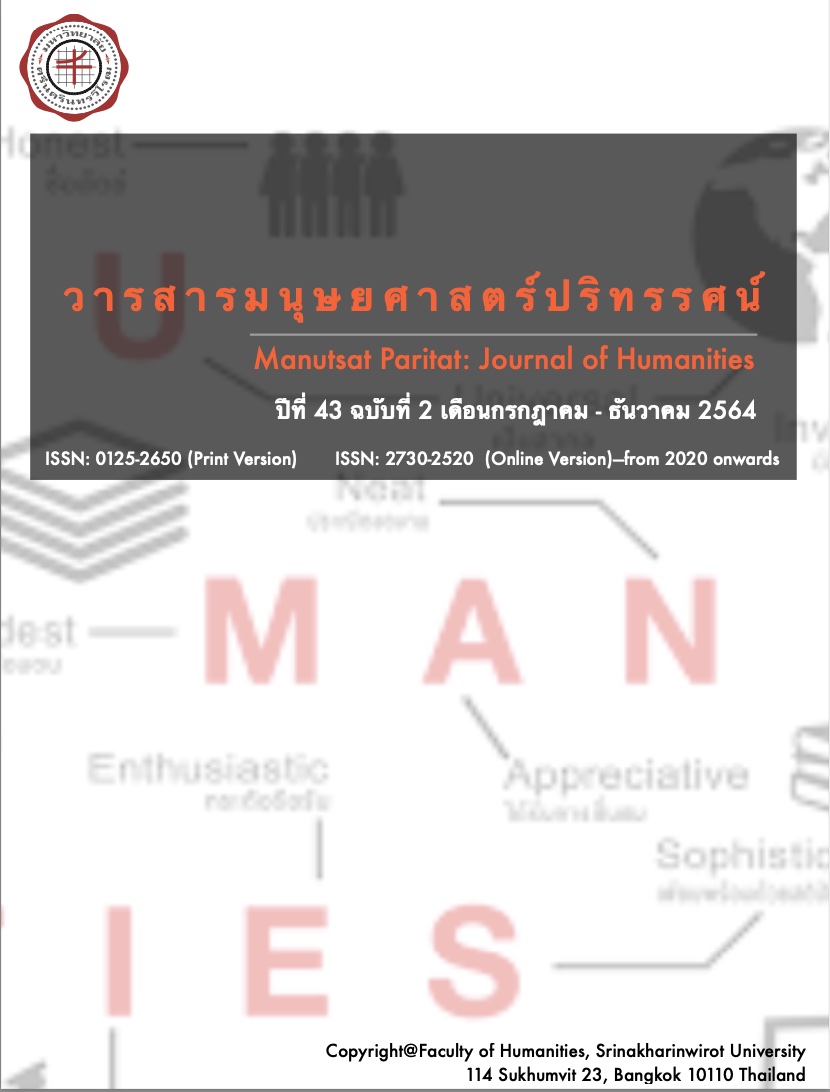Psychological Experience Of Trainee Counselors With Compassion Fatigue
Main Article Content
Abstract
The principle aim of this qualitative research is to explore Psychological Experience Of Trainee Counselors With Compassion Fatigue. The data were collected via semi-structured in-depth interviews and analyzed using Interpretative Phenomenological Analysis (IPA). The participants in this research included seven trainee counselors with compassion fatigue. The findings were grouped into three main themes below:
1) Factors that cause Compassion Fatigue. This also client participation, Skill and experience and Self-management and service
2) Effect of Compassion Fatigue. This also decreased efficiency in daily life and difficulty showing empathy.
3) Dealing with Compassion Fatigue. This also self-care and support from surrounding communities.
The results of this research were done to provide information to Trainee Counselors who have or experienced compassion fatigue or those who involved.
Article Details
Any unauthorized copying, publication, reproduction or distribution of copyrighted works appeared in Manutsat Paritat: Journal of Humanities is an infringement of the copyright owners’ rights. To authorize the copying, publication, reproduction or distribution of copyrighted works to be appeared in other printed materials or any online media, please write to MPJHthaijo@gmail.com for permission.
References
โสรีช์ โพธิ์แก้ว. (2553). การสังเคราะห์หลักอริยสัจ 4 สู่กระบวนการปรึกษาเชิงจิตวิทยา/ จิตรักษาเพื่อการพัฒนารักษา และเยียวยาชีวิตจิตใจ: แนวคิด แนวทางประสบการณ์ และงานวิจัย. กรุงเทพมหานคร: จุฬาลงกรณ์มหาวิทยาลัย.
Chi, M. T. H., Glaser, R., & Farr, M. J. (Eds.). (1988). The nature of expertise. Hillsdale, NJ: Erlbaum.
Code of ethics and conduct. (2009). Leicester: The British Psychological Society. Retrieved May 25, 2019, from https://www.bps.org.uk/sites/bps.org.uk/files/Policy/Policy - Files/Code of Ethics and Conduct (2009).pdf.
Figley, C. R. (1995). Compassion fatigue: Toward a new understanding of the costs of caring.
Figley, C. R. (2002). Compassion fatigue: Psychotherapists chronic lack of self care. Journal of Clinical Psychology, 58(11), 1433-1441. doi:10.1002/jclp.10090
Figley, C. R. (2012). Basics of compassion fatigue. Retrieved May 20, 2019, from
http://www.figleyinstitute.com/documents/Workbook_AMEDD_SanAntonio_2012July20_RevAugust2013.pdf
Killian, K. D. (2008). Helping till it hurts? A multimethod study of compassion fatigue, burnout, and self-care in clinicians working with trauma survivors. Traumatology, 14(2), 32-44.
Portnoy, D. (2011). Burnout and compassion fatigue: watch for the signs. Health Progress,92(4), 46-50.
Rogers, C. R. (1957). The necessary and sufficient conditions of therapeutic personality change. Journal of Consulting Psychology, 21(2), 95.
Rummell, C. M. (2015). An exploratory study of psychology graduate student workload, health, and program satisfaction. Professional Psychology: Research and Practice, 46(6), 391.
Rogers, C. R. (1975). Empathic: An unappreciated way of being. The Counseling Psychologist, 5(2), 2-10. doi:10.1177/001100007500500202
Rønnestad, M. H., & Skovholt, T. M. (2003). The journey of the counselor and therapist: Research findings and perspectives on professional development. Journal of Career Development, 30(1), 5-44. doi:10.1177/089484530303000102
Slatten, L. A., Carson, K. D., & Carson, P. P. (2011). Compassion fatigue and burnout: What managers should know. The Health Care Manager, 30(4), 325-333.
Smith, J., Flowers, P., & Larkin, M. (2009). Interpretative phenomenological analysis: Theory, method, and research. Los Angeles: SAGE.
Stamm, B. H. (2002). Measuring compassion satisfaction as well as fatigue. Treating compassion fatigue, 7-119.
Thompson, I., Amatea, E., & Thompson, E. (2014). Personal and contextual predictors of mental health counselors' compassion fatigue and burnout. Journal of Mental Health Counseling, 36(1), 58-77.
Yassen, J. (1995). Preventing secondary traumatic stress disorder. In C. R. Figley (Ed.), Brunner/Mazel psychological stress series, No. 23. Compassion fatigue: Coping with secondary traumatic stress disorder in those who treat the traumatized (pp. 178-208). Philadelphia, PA, US: Brunner/Mazel.
Zantinge, E. M., Verhaak, P. F., de Bakker, D. H., van der Meer, K., & Bensing, J. M. (2009). Does burnout among doctors affect their involvement in patients' mental health problems? A study of videotaped consultations. BMC family practice, 10(1), 1-10.


